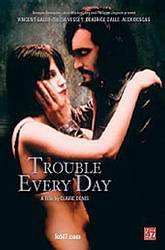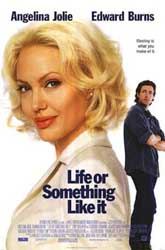 Director: Starring:
OTHER REVIEWS: For Love
of the Game The Gift Mystery
Men X-Men |
Spider-Man BY: DAVID PERRY Samuel L. Jackson stated one of cinema's most anguishing lines in recent years at the end of Unbreakable: "you don't know what it's like to not know you're purpose in life. Now I know: I am Mr. Glass." Written by a comic book fan for a comic book fan character, the milieu present in M. Night Shyamalan's existentially sad dichotomy of the superhero and the supervillain has been, for lack of a better word, cartoonishly flipped for the new ultra-budgeted blockbuster Spider-Man. Sam Raimi's first entry into what is sure to be one of the most profitable franchises for the new decade does try -- almost strains -- to capture some of the Shyamalan quandary. However, Spider-Man has been made for the masses, chipped and molded into a form that will produce the most revenue -- one of the reasons Unbreakable ultimately disappointed many The Sixth Sense fans was its unwillingness to pander to the common wants of the American movie-going public. That said, its hard to dislike the amiable Raimi production, which corners much of the director's over-the-top personality in an amalgam of special effects and forlorn misery that seems to understand what people want to see to have fun even if not really taking into account the emotional impact that can be imposed. Sure, the film's pitch-perfect finale achieves this, but looking at the previous two hours of the films bears little relationship to the despondency Raimi and screenwriter David Koepp throw in for the ending. But, have no fear, the audience is left for one last egregious collection of CGI-flips through the New York skyline: even if it has to be in the final frames, Raimi et al. include as many Griffin Mills standards of film production as he can muster. I digress: Spider-Man is an easily consumable work from Hollywood -- it may not know much about conservatism, but at least it does include enough of those occasional fine moments to convince the audience that we are not about to walk into another Batman franchise (note to Columbia: keep Joel Schumacher far away from the sequels). This is the type of movie made to sell tickets that actually leaves people feeling their money was well spent by the end -- if Episode I is any indication, one-time wonder boy George Lucas should pick up some tips from Raimi before he gets into Episode III (we shall see if he has learned anything since the 1999 debacle when Episode II comes out in a few weeks). The story for Spider-Man is almost 40 years old and, yet, still seems to have a gleaning amount of interest today. Much to the credit of Stan Lee and Steve Ditko, this movie comes to the screen with little need for revisions -- only a couple changes were made to take it from a dated Cold War initiative into a fast-paced tech-age blockbuster (the spider that bites Peter Parker is no longer radioactive but instead genetically-enhanced). However, there is one thing that needs some work: that horrendous dialogue. Comic book fans would have been up in arms had Koepp excised the stilted discourse found in the comics, but that appreciation is rather closed to that subgroup; anyone unacquainted with the source material outside of the television show, myself included, will be aching for a rewrite after some of the one-liners come from the characters. But, hey, considering last year's Academy Awards, this is enough to get Koepp an Oscar. The real pleasures involved in the new qualities for Spider-Man is in the director and the cavalcade of actors he has assembled. Sam Raimi has made a career out of cheeky, self-reflexive exercises in camp. I like the way his films feel like they are the efforts of someone having as much fun playing with the camera as telling the story. The Evil Dead trilogy and Darkman were both enjoyable thanks to the way they experiment with every guerilla tactic that a man can muster, even when on the steam of a major studio. His out-of-the-genre films, often show a similar versatility with a devotion to the genre coming to life, admittedly, though, sometimes to the disservice of the film (i.e. The Quick and the Dead). His best film, A Simple Plan, remains a testament of why Sam Raimi has a cult following that goes far beyond horror fans -- his credits are of a camp auteur far beyond the textual obsessions of Roger Corman and John Waters. Raimi is willing to craft Spider-Man into a watchable effort in the superhero genre, though his lack of experience in the field makes for some dismissible but inspired choices with the camera. This is especially true in working with the heavy use of CGI (none of which, to tell the truth, looks that spectacular) to create Spider-Man swinging through the city en route to some damsel in distress. The hiring of Tobey Maguire to play Spider-Man's alter ego Peter Parker left many fans of the character unhappy; but Maguire does the character far more service than early considerations Freddie Prinze, Jr., and Leonardo DiCaprio would have done. He captures the starry-eyed wonderment of nerd empowerment unlike anyone else; the sense of stern responsibility that controls the film's second half is believable because of the tinges of Philip Roth's Portnoy that Maguire successfully exemplifies in the first half. Willem Dafoe also delivers a great performance, though his is far more grandiose than Maguire's work. Playing Spider-Man's enemy the Green Goblin and his genius scientist/corporate honcho alter ego Norman Osborn, Dafoe generates the same slimy wickedness that has kept him in movies even after trying to play naïve in Mississippi Burning. James Franco struggles with the divisions between friend, lover, and son as Harry Osborn, though his work here is more impressive than the overrated performance as James Dean he tried to pull off last year. Kirsten Dunst, a highly effective actress, is never given anything to do in the film and is, therefore, wasted in a collection of scenes meant merely as hints at the relationship budding between Peter Parker and Dunst's scarlet-haired Mary Jane Watson. Following on the heels of Blade and X-Men,
Spider-Man serves as merely the third entry in a new wave of comic book
adaptations following the collection of disappointments from the 1990s. Stephen
Norrington's Ghost Rider, Mark Steven Johnson's Daredevil, and Ang Lee's The
Hulk are all currently at work, with many more (including Guillermo Del Toro's Hellboy
and Peyton Reed's Fantastic Four) are in pre-production. Though some of these
directors have the prowess to give their films the zing found in Unbreakable, a
completely original concept for a comic book styled film, I doubt any of them will. Sam
Raimi, like all the others, understands that to keep this film wave running, absolute
quality comes after ensuring the film surpasses its high production expenses. Don't hold
your breath for the grimness of Tim Burton's Batman, bright colors reign supreme
in a world where America needs its heroes in tights with awful quips ready to unfurl and
the flag waving behind. "With great power comes great responsibility" has become
"with great budgets comes great complacency." |






